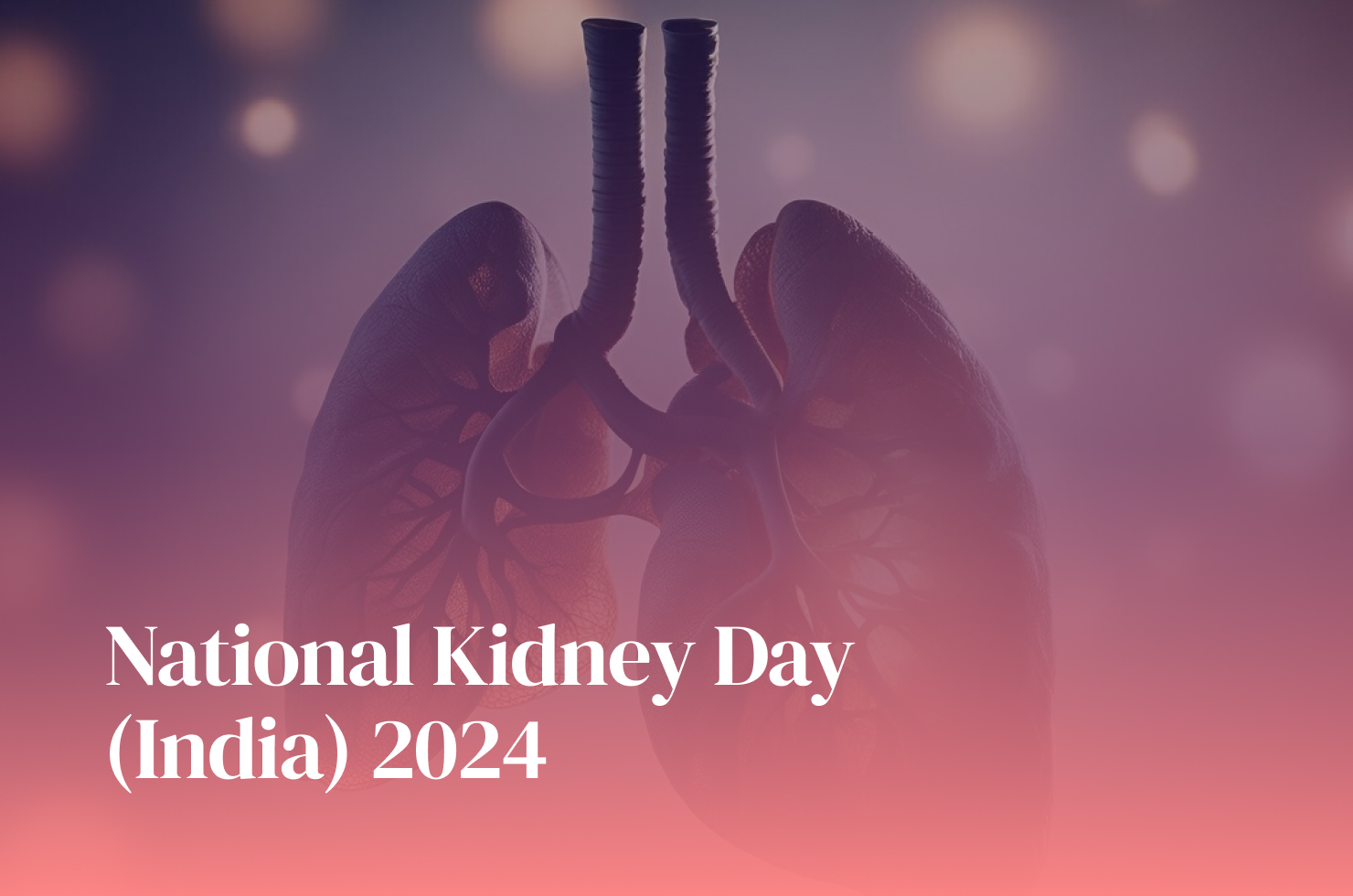National Kidney Day – March 10 (India)
National Kidney Day, celebrated annually on March 10th, is a crucial occasion aimed at raising awareness about kidney health. The day serves as a platform to educate individuals about the importance of kidney function, prevention of kidney diseases, and the significance of early detection and treatment.
There are several reasons why National Kidney Day is celebrated:
1. Raise Awareness:
One of the primary objectives of National Kidney Day is to increase awareness about kidney health among the general public. Many people may not be aware of the functions of the kidneys, risk factors for kidney disease, or the importance of regular check-ups.
2. Preventive Measures:
National Kidney Day emphasizes preventive measures to reduce the risk of kidney diseases. This includes promoting a healthy lifestyle, maintaining a balanced diet, staying hydrated, exercising regularly, avoiding smoking and excessive alcohol consumption, and managing underlying health conditions such as diabetes and hypertension.
3. Early Detection:
Early detection of kidney diseases is crucial for effective treatment and management. National Kidney Day encourages individuals to undergo regular health screenings, including blood tests and urine tests, to assess kidney function and detect any abnormalities at an early stage.
4. Advocate for Research:
National Kidney Day also serves as an opportunity to advocate for increased funding and support for kidney research. Research plays a vital role in understanding the causes of kidney diseases, developing new treatments, and improving outcomes for patients with kidney conditions.
5. Support Patients:
The day is also a time to show support for individuals living with kidney diseases and those undergoing dialysis or kidney transplant. It highlights the challenges faced by kidney patients and the importance of providing them with access to quality healthcare and support services.
6. Promote Organ Donation:
National Kidney Day raises awareness about the importance of organ donation, particularly kidney donation. Many people are in need of a kidney transplant due to end-stage kidney failure, and increasing the number of organ donors can save lives and improve the quality of life for those awaiting transplantation.
In conclusion, National Kidney Day on March 10th serves as a significant reminder of the importance of kidney health and the need for proactive measures to prevent kidney diseases and improve outcomes for individuals affected by these conditions. By raising awareness, promoting preventive measures, advocating for research, supporting patients, and encouraging organ donation, we can work towards ensuring better kidney health for all.
How can schools raise awareness on National Kidney Day – March 10?
Schools play a crucial role in raising awareness about health-related issues, including National Kidney Day on March 10th. Here are several ways schools can promote awareness on this important day:
1. Educational Workshops:
Organize educational workshops or seminars for students, parents, and staff members to learn about kidney health, functions of the kidneys, common kidney diseases, risk factors, and preventive measures.
2. Guest Speakers:
Invite healthcare professionals, nephrologists, or representatives from kidney health organizations to speak to students about kidney health, share personal stories of individuals affected by kidney diseases, and provide information on how to maintain healthy kidneys.
3. Poster Competitions:
Hold poster-making competitions on the theme of kidney health and National Kidney Day. Encourage students to create posters that highlight key messages about kidney health, the importance of early detection, and preventive measures.
4. Health Campaigns:
Launch health campaigns within the school community to promote kidney health. Distribute informational pamphlets, brochures, or fact sheets about kidney health and National Kidney Day. Display posters and banners in school hallways and common areas.
5. Physical Activities:
Organize physical activities or sports events that promote physical fitness and healthy lifestyle habits, which are beneficial for kidney health. Encourage students to participate in activities like walking, jogging, or yoga, and emphasize the importance of staying active.
6. Healthy Eating Initiatives:
Offer healthy food options in school cafeterias that promote kidney health, such as fresh fruits, vegetables, whole grains, lean proteins, and low-sodium options. Provide nutrition education and cooking demonstrations to teach students about making kidney-friendly food choices.
7. Social Media Campaigns:
Utilize social media platforms to raise awareness about National Kidney Day. Share kidney health facts, tips for maintaining healthy kidneys, and inspirational stories of kidney transplant recipients or individuals living with kidney diseases.
8. Fundraising Events:
Organize fundraising events or charity drives to support kidney health organizations or research initiatives. Encourage students to participate in fundraising activities like walkathons, bake sales, or talent shows to raise funds for kidney-related causes.
By implementing these initiatives, schools can effectively raise awareness about National Kidney Day and empower students to prioritize their kidney health and adopt healthy lifestyle habits for overall well-being.
Rare kidney diseases
Rare kidney diseases are a group of disorders affecting the kidneys that are characterized by their low prevalence in the population. While individual rare kidney diseases are uncommon, collectively, they pose a significant burden on affected individuals and their families due to limited treatment options, challenges in diagnosis, and often progressive nature. Here’s an overview of rare kidney diseases:
1. Alport Syndrome:
Alport syndrome is a genetic condition that primarily affects the kidneys, ears, and eyes. It is characterized by progressive kidney damage, hearing loss, and eye abnormalities. Alport syndrome is caused by mutations in genes encoding type IV collagen, a protein essential for the structure and function of the kidney’s filtration system.
2. Polycystic Kidney Disease (PKD):
PKD is a genetic disorder characterized by the growth of cysts in the kidneys, leading to kidney enlargement and loss of function over time. Autosomal dominant polycystic kidney disease (ADPKD) and autosomal recessive polycystic kidney disease (ARPKD) are the two main forms of PKD. ADPKD typically presents in adulthood and is more common, while ARPKD presents in infancy or childhood and is less common but more severe.
3. Cystinosis:
Cystinosis is a rare metabolic disorder characterized by the accumulation of cystine crystals within cells throughout the body, including the kidneys. These crystals can cause kidney damage and lead to kidney failure if left untreated. Cystinosis is usually diagnosed in infancy or early childhood and requires lifelong treatment with medications to manage symptoms and slow disease progression.
4. Focal Segmental Glomerulosclerosis (FSGS):
FSGS is a rare kidney disorder characterized by scarring (sclerosis) of the glomeruli, the tiny blood vessels within the kidneys that filter waste and excess fluids from the blood. This scarring disrupts kidney function, leading to proteinuria (protein in the urine), edema (swelling), and eventually kidney failure. FSGS can be idiopathic (of unknown cause) or secondary to other conditions.
5. Membranous Nephropathy:
Membranous nephropathy is a rare autoimmune kidney disease characterized by thickening of the glomerular basement membrane, which impairs kidney function. It often presents with proteinuria, hypoalbuminemia (low levels of albumin in the blood), and edema. Membranous nephropathy can be primary (idiopathic) or secondary to underlying conditions such as infections, autoimmune diseases, or certain medications.
6. Nephrotic Syndrome:
Nephrotic syndrome is a group of symptoms that occur when the kidneys leak large amounts of protein into the urine, leading to low levels of protein in the blood and fluid retention. While primary nephrotic syndrome is relatively common, certain rare forms, such as congenital nephrotic syndrome, are caused by genetic mutations and present in infancy or early childhood.
7. Thin Basement Membrane Disease (TBMD):
TBMD is a rare kidney disorder characterized by thinning of the glomerular basement membrane, which may lead to hematuria (blood in the urine) and occasionally proteinuria. While TBMD usually does not cause significant kidney dysfunction or progress to kidney failure, affected individuals may have an increased risk of developing kidney stones or hypertension later in life.
In conclusion, rare kidney diseases encompass a diverse group of disorders that can affect individuals of all ages and have varying genetic, autoimmune, and metabolic origins. While each rare kidney disease presents unique challenges in diagnosis and management, advances in research and medical technology offer hope for improved understanding, earlier detection, and targeted therapies to improve outcomes for affected individuals.
Common Kidney Disease in India
In India, kidney diseases are a significant public health concern, with several common conditions contributing to the burden of kidney-related morbidity and mortality. Here are some of the most prevalent kidney diseases in India:
1. Chronic Kidney Disease (CKD):
CKD is a progressive condition characterized by the gradual loss of kidney function over time. In India, CKD is a growing health problem, largely due to the rising prevalence of diabetes and hypertension, which are major risk factors for CKD. Other contributing factors include poor access to healthcare, inadequate screening and prevention programs, and environmental factors such as pollution and poor sanitation.
2. Diabetic Nephropathy:
Diabetes is one of the leading causes of CKD in India. Diabetic nephropathy refers to kidney damage caused by diabetes, particularly type 2 diabetes. The prevalence of diabetes in India has been steadily increasing, driven by factors such as urbanization, sedentary lifestyles, and changes in dietary habits. Without proper management, diabetic nephropathy can progress to end-stage renal disease (ESRD), requiring dialysis or kidney transplantation.
3. Hypertensive Nephropathy:
Hypertension, or high blood pressure, is another common cause of CKD in India. Uncontrolled hypertension can damage the blood vessels in the kidneys, impairing their ability to filter waste and excess fluid from the blood. Hypertensive nephropathy is often asymptomatic in the early stages but can lead to kidney failure if left untreated. Lifestyle modifications, including dietary changes and regular exercise, are crucial for managing hypertension and preventing kidney damage.
4. Glomerulonephritis:
Glomerulonephritis refers to inflammation of the glomeruli, the tiny filters in the kidneys responsible for removing waste and excess fluid from the blood. In India, glomerulonephritis can be caused by various factors, including infections (such as streptococcal infections), autoimmune diseases, and genetic factors. The clinical presentation and prognosis of glomerulonephritis vary depending on the underlying cause and severity of kidney damage.
5. Kidney Stones:
Kidney stones, or nephrolithiasis, are common in India, particularly in regions with high temperatures and low humidity. Risk factors for kidney stones include dehydration, dietary factors (such as high intake of salt and oxalate-rich foods), obesity, and certain medical conditions. Kidney stones can cause severe pain and discomfort and may lead to complications such as urinary tract infections and kidney damage if not treated promptly.
6. Urinary Tract Infections (UTIs):
UTIs are a common cause of kidney-related morbidity in India, especially among women. Factors such as poor hygiene, inadequate sanitation facilities, and a high prevalence of sexually transmitted infections contribute to the burden of UTIs. Untreated UTIs can lead to kidney infections (pyelonephritis) and, in severe cases, sepsis and kidney damage.
In conclusion, kidney diseases pose a significant health burden in India, driven by factors such as the high prevalence of diabetes and hypertension, inadequate access to healthcare services, and environmental and lifestyle factors. Early detection, timely intervention, and comprehensive management strategies are essential for addressing the growing epidemic of kidney diseases and improving outcomes for affected individuals. Public health initiatives focusing on prevention, education, and access to affordable healthcare are needed to mitigate the impact of kidney diseases in India.
How to keep your kidneys healthy?
Keeping your kidneys healthy is crucial for overall well-being as they play a vital role in filtering waste products and excess fluid from the blood, regulating blood pressure, and producing hormones that control red blood cell production and promote bone health. Here are some tips on how to keep your kidneys healthy:
1. Stay Hydrated:
Adequate hydration is essential for kidney health as it helps to flush toxins from the body and prevent the formation of kidney stones. Aim to drink at least 8-10 glasses of water per day, or more if you are physically active or live in a hot climate.
2. Follow a Balanced Diet:
Maintain a healthy diet that is low in sodium, saturated fats, and added sugars, and rich in fruits, vegetables, whole grains, and lean proteins. Foods high in antioxidants, such as berries, leafy greens, and nuts, can help protect the kidneys from damage caused by oxidative stress.
3. Monitor Blood Pressure:
High blood pressure can damage the kidneys over time, so it’s important to monitor your blood pressure regularly and take steps to keep it within a healthy range. This may include following a low-sodium diet, exercising regularly, and taking prescribed medications as directed by your healthcare provider.
4. Manage Blood Sugar:
If you have diabetes, it’s crucial to manage your blood sugar levels to prevent damage to the kidneys. Follow your diabetes management plan, including monitoring your blood sugar regularly, taking medications as prescribed, and making healthy lifestyle choices such as eating a balanced diet and exercising regularly.
5. Maintain a Healthy Weight:
Being overweight or obese increases the risk of developing kidney disease, so aim to achieve and maintain a healthy weight through a combination of regular physical activity and a balanced diet. Consult with a healthcare professional to determine a weight loss plan that is safe and effective for you.
6. Limit Alcohol Consumption:
Excessive alcohol consumption can impair kidney function and lead to dehydration, so it’s important to drink alcohol in moderation. Limit your intake to no more than one drink per day for women and two drinks per day for men.
7. Quit Smoking:
Smoking can damage blood vessels and decrease blood flow to the kidneys, increasing the risk of kidney disease. If you smoke, talk to your healthcare provider about strategies to quit smoking and improve your overall health.
8. Exercise Regularly:
Regular physical activity can help maintain a healthy weight, lower blood pressure, and improve overall kidney function. Aim for at least 30 minutes of moderate-intensity exercise most days of the week, such as brisk walking, cycling, or swimming.
9. Get Enough Sleep:
Adequate sleep is essential for overall health, including kidney health. Aim for 7-9 hours of quality sleep per night to allow your body to repair and regenerate tissues, including the kidneys.
10. Manage Stress:
Chronic stress can contribute to high blood pressure and other risk factors for kidney disease, so it’s important to find healthy ways to manage stress. This may include practicing relaxation techniques such as deep breathing, meditation, or yoga, as well as engaging in activities you enjoy and spending time with loved ones.
By following these tips and adopting a healthy lifestyle, you can help protect your kidneys and reduce your risk of developing kidney disease. Remember to consult with a healthcare professional before making any significant changes to your diet or exercise routine, especially if you have underlying health conditions.
Conclusion
In conclusion, National Kidney Day serves as a critical reminder of the importance of kidney health and the prevention of kidney disease. By raising awareness about the risk factors, symptoms, and prevention strategies associated with kidney disease, we can empower individuals to take proactive steps to protect their kidney health and reduce their risk of developing kidney-related complications. Through education, advocacy, and community outreach efforts, we can work together to promote early detection, timely intervention, and access to quality care for individuals affected by kidney disease.
As we observe National Kidney Day 2024 and beyond, let us commit to supporting kidney health initiatives, fostering partnerships between healthcare providers, policymakers, and community stakeholders, and advocating for policies and programs that prioritize kidney health and wellness. Together, we can make a positive impact on the lives of millions of individuals affected by kidney disease and improve the overall health and well-being of our communities.
Learn More : Important Health Days 2024 – Worldwide & India



